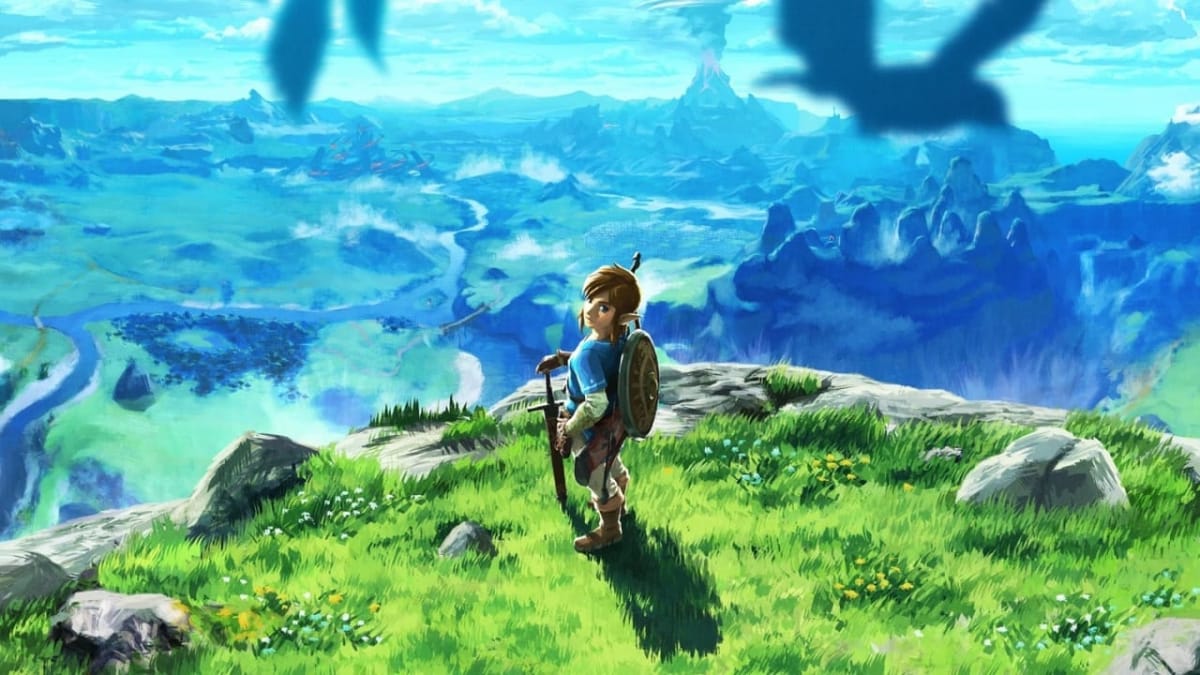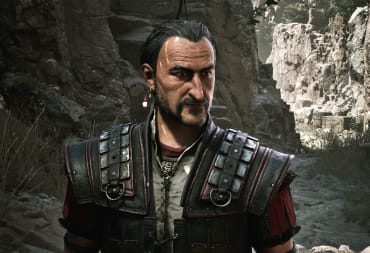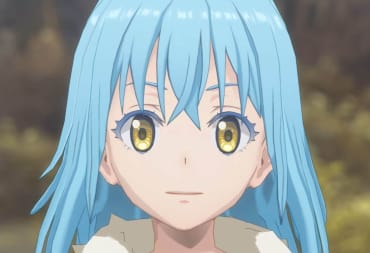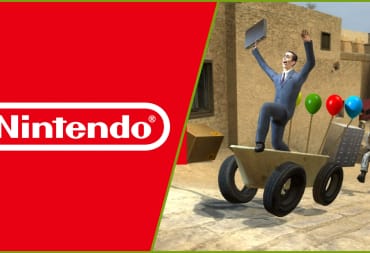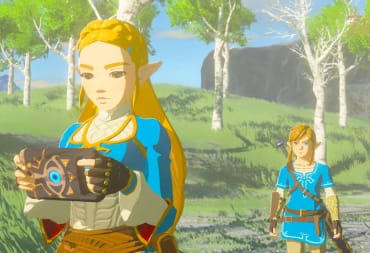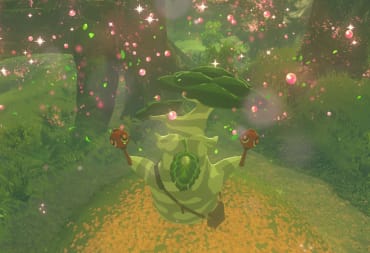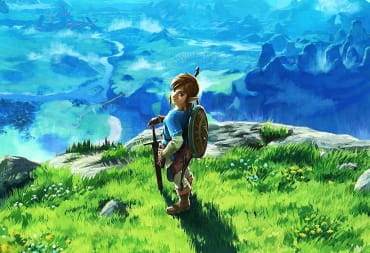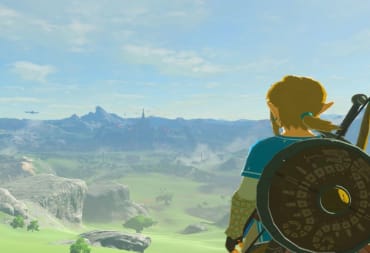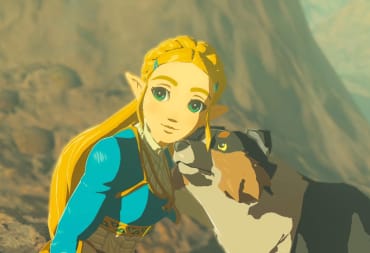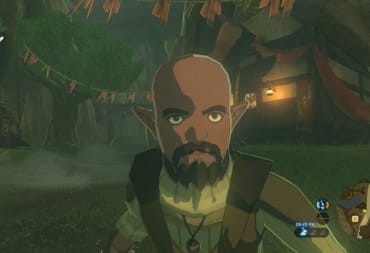After ascending a series of waterfalls, I’ve reached Ploymus Mountain’s plateau peak. I’m in a land caught in perpetual rainfall, and right now, I’m nervously weighing my options as I crouch in soaked attire behind a bolder. A Lynel is trotting around the area, and with only a handful of hearts and fair equipment to account for, I don’t know if I’m ready to take him on. On one hand, all I need to do is gather electric arrows. Since the savage centaur has strewn them around the vicinity, I can sneak around and gather enough to head back and face the Zora Domain’s Divine Beast. On the other, the prospect of rare items and the challenge in itself of facing the beast is enticing enough. I’ve already fallen to it numerous times, but I’ve learned from my mistakes. I equip my greatest weaponry knowing it’s bound to break. I drink an elixir and plan out which meals to eat that I’ve concocted when I’m on the brink of death. I grit my teeth and race onto the battleground, pelting the Lynel with a volley of arrows for as long as I’m able. He’s charging me again with his incredible sword, but this time, he won’t catch me off guard.
I’ve only played around 10 hours of The Legend of Zelda: Breath of the Wild and can see why critics are claiming it to be a masterpiece. The shrines are progressively revealing their puzzles’ depth and ingenuity. Combat is shockingly unforgiving considering the franchise’s past, but I love how this encourages you to play wisely and avoid enemies you’re not ready for yet, thereby giving incentive to return to previous locales. The AI’s perceptive behavior, the uncanny attention to the open world’s details and chemistry, the sense of tranquility with the soothing ambience and minimal soundtrack—Nintendo has truly made something special: a radical departure from what I’ve come to expect from The Legend of Zelda that has taken me aback with wonder. It’s one of the first open worlds I’ve experienced where I feel less motivated to stick to a linear path. It beckons me to explore, adapt, and discover. I marvel at how I’ve still seen so little, and while I know the game has numerous flaws that can steal its shine for some players more than others, there’s a brilliance at its core that cannot be dispelled.
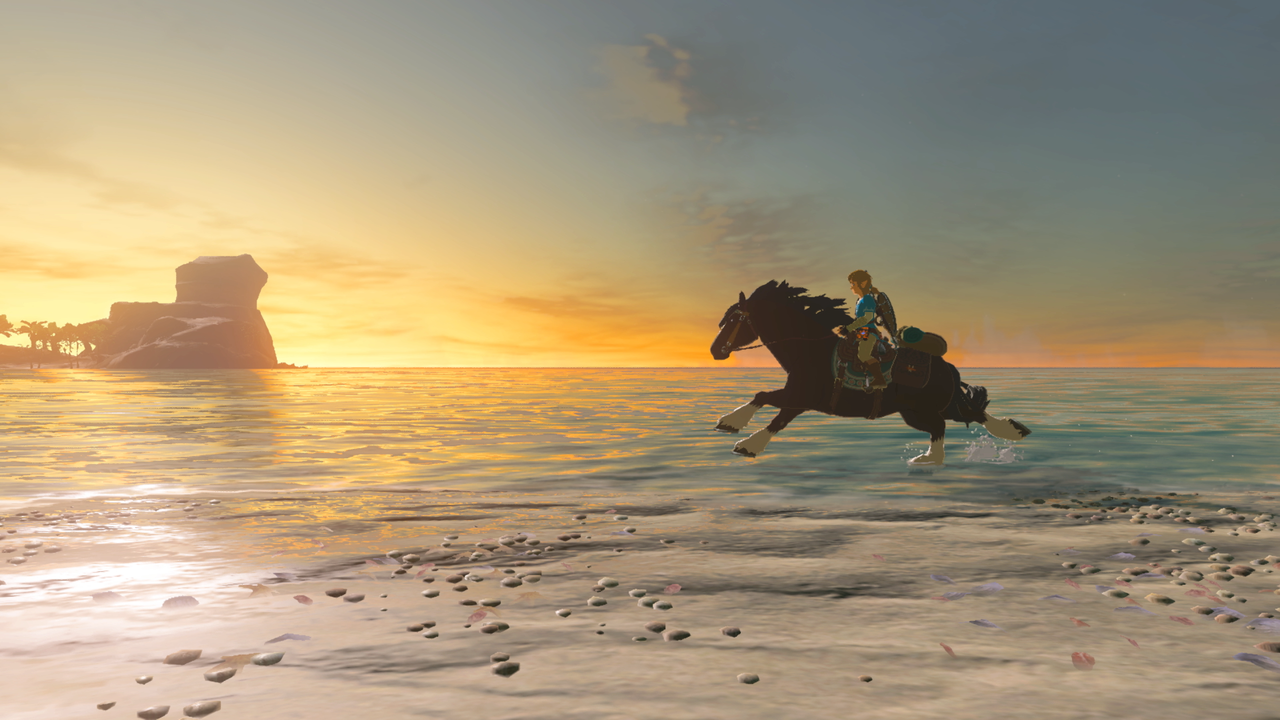
Such praise is but a sample of the overall consensus among critics, but a handful in the field are more vocal and sensitive to blemishes. Do their uncommon opinions shed reasoned light through the cracks of Breath of the Wild’s seemingly near-perfect surface, bringing to bare the rose-tinted glasses that many reviewers might have worn in handing out hasty, unbalanced verdicts? Or are these naysayers only late to the party to bring in clicks with sensationally contrarian claims that are misleading or faked? The answer, as always, isn’t black and white, but it’s safe to say how people largely react to controversies like this is shameful.
I’ve seen the calls to remove Michael Thomsen’s review score for Uncharted 4: A Thief’s End from Metacritic last year, with many proclaiming he shouldn’t be allowed to critique the medium, especially given his record of seemingly unironic articles that are either the ravings of a madman or nuanced exercises in reverse-psychology. Jim Sterling is no stranger to controversy with his reviews for Assassin’s Creed II and Final Fantasy XIII. One wonders if Tom Chick is trying to be game journalism’s equivalent of Armond White. The same backlash for negative reviews can go for uncharacteristically optimistic ones with poorly received games. Calvin Robinson’s 10 out of 10 score for Call of Duty: Ghosts is shockingly glowing, considering it’s universally regarded as the weakest in the franchise over the past decade. The same could be said for Nick Cowen’s self-aware critique of Aliens: Colonial Marines. “See those four stars above this review? I fully expect to receive a right royal kicking in the comment section below this article for that rating.” He sure did, and while it's baffling how he isn't so bothered over the game's glaring issues, his stubbornly unshakable optimism is impressive in a sense. And I personally find it curious that Game Informer’s Editor-in-Chief Andy McNamara would let the first game he’s reviewed in years be Destiny’s The Taken King, as if to ensure a high score given his outspoken, unapologetic love for Bungie’s baby. However, given his acknowledgement of Destiny's issues in his otherwise solid review, this is but an Alex Jones-style conspiracy theory on my part. It's a knee-jerk reaction I had before reading what he had to say. That's something we have to fight against with every review.
Whether outlying reviews are positive or negative, calling them “real” reviews that go against the grain or “fake” ones that are only seeking attention are wrong ways to perceive them. We need to approach reviews by their content, not just by their score. We should pay more attention to the individual and their record, not wholly judge an outlet. We must be advocates that their opinions are allowed, not censored. Reviews should be judged by their sincerity and quality. This is how the scrutiny of readers should be guided, which is why I believe it’s timely to demonstrate this in action with an analysis of Breath of the Wild reviews–both glowing and harsh–that distinguish between strong and lacking criticism. In doing so, I only intend to provide honest dissections of published content in the hopes that we can all learn from one another. Be it far from me to suggest that we can discern a reviewer’s intentions. This is impossible and fruitless, but the least we can do is practice educated evaluations to see if they are being fair. Let’s begin with an overview of samples that call Nintendo’s latest one of the “all-time greats” to see if any of them are discernibly blinded by nostalgia.
Breath of Praise
When you have people unanimously agree apart from one another about something, it only gives more legitimacy to their individual opinions, especially since this is a rare occurrence on such a grand scale in game journalism with Breath of the Wild. EDGE Magazine has issues with the game’s preciseness required with combat and technical performance, but “if all gets too much, you can simply turn around, point yourself in the compass direction of your choosing, and go somewhere else. There, chances are, you’ll find magic,” which is so abundant in the game that “Ocarina of Time may have to settle for second place.” It’s one of the more critical analyses of why the open world and nonlinear nature of the game works for the writer from every angle, and for one of the high-brow outlets that has only given out 18 “Revolutionary” scores since 1993 (with only two of them being for The Legend of Zelda titles), adding a third from the series is no common event.
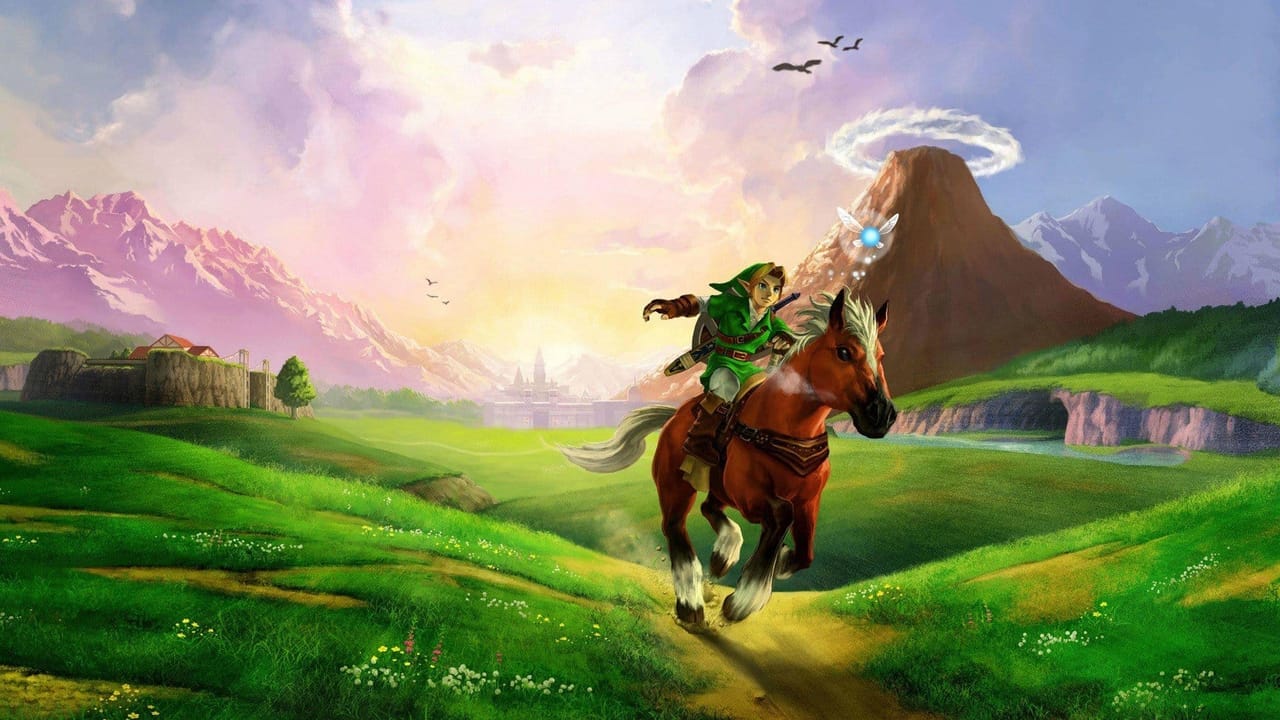
The same goes for GameSpot, which has only had 12 titles since 1996 receive the elusive number, now adding Breath of the Wild to its ranks. Even though Peter Brown writes that “you're forced to reconsider almost everything you've learned from past Zelda games” by figuring out things on your own, embracing the hostile environments, and learning the groove intended for the weapon durability system, the game “creates a steady, consistent feeling of gratification throughout the entire experience.” Eurogamer’s Oli Welsh believes the story falters in several ways, but admits this is not a necessity and how a more tightly-tuned storyline might’ve not been “compatible” with the “superb sandbox game design, free of fiddle or bloat, unencumbered with preconceptions, and executed with the rock-solid reliability, tactile feedback and arcade brio for which Nintendo is justly celebrated,” which is enough to earn the game an “Essential” stamp. Paste’s Garrett Martin writes, “[t]hat indifference and the overwhelming amount of things you can do in this world combine to create a bewitching aimlessness,” despite the fact he slaps Nintendo on the wrist for learning from the “Ubisoft school of climbing towers” and that weapons break far too much. Yet “they don't spoil the atmosphere. Forget the goals and sidequests, the collectibles and perishables: what matters is the mise-en-scène." He dishes out a 9.7 out of 10.
Kyle Hilliard echoes the sentiments of many reviewers about how often you are killed and, again, the weapon durability, but “the difficulty of the game is reasonable, and incredibly rewarding when the preparation pays off” and “the degradation mechanic is ultimately one I just learned to cope with" since he believes the game offers a plethora of weapons meant to be replaced often. The voice acting cast is “underwhelming” and there are technical issues as well, but the latter doesn’t “disrupt the experience. [...] [This game] represents a profound new direction for one of gaming’s best franchises and a new high point for open-world interactive experiences.” He crowns it with a Platinum score of 10. Polygon’s Arthur Gies pens a level-headed critique that covers all the bases. “Breath of the Wild isn’t just difficult for the sake of it, or unnecessarily complicated. All that discovery and progress is deeply, intensely rewarding, and it builds on itself many times over as the world opens up. [...] That sense of consistent achievement and discovery is incredibly important, because it’s the driving force behind Breath of the Wild. Combat is functional, and I rarely died because of systemic inadequacies.” He seems to lean toward disliking the game’s cooking aspect and the difficulty, but errs on the side that these systems are fair and part of what makes the game a true adventure. He awards it a 10.
Even Joe Vargas of the AngryJoeShow gives the game “the highest possible 9 out of 10 I can give with the easiest bad ass seal of approval I have ever issued” for the aforementioned reasons. He was disappointed by the voice acting, lack of button remapping, most of the characters, weapon durability, and music (as someone who has never played a game in the franchise nor has an amiable relationship with Nintendo), that doesn't bring down his opinion much. “This game does such a great and wonderful job of rewarding your experimentation all of the time.” He goes out of his way near the end to comment on how unique a game like this is for him. Even though it has glaring problems in his eyes, he insists it’s so close to earning a 10. And just as he’s late to the day one reviews, Destructoid’s CJ Andriessen admits that he approached the game with different expectations. “I spent too much playing this game as if it were every other Zelda game, even though all the signs were telling me to do otherwise. It wasn’t until I died for what felt like the 50th time fighting my second dungeon boss that I realized I had to change how I played.” Rather than stubbornly sticking to what he expected or wanted going in, he adapted to the game and came to adore its combat, survival, exploration, and puzzles for the reasons he states. Despite writing a paragraph admitting the game’s flaws, the following speaks volumes for his score of 10. “I get those concerns exist, I just don’t really care. Not one of them dampened my enjoyment of this title in any way or took away from the pure joy of picking a direction and just going. The topography of Hyrule is so thoughtfully littered with points of interest, its siren song seducing me to each tower, to each shrine, to each interesting rock formation that actually turned out to be a puzzle. The sense of discovery here is like nothing I’ve felt in a long, long time.”
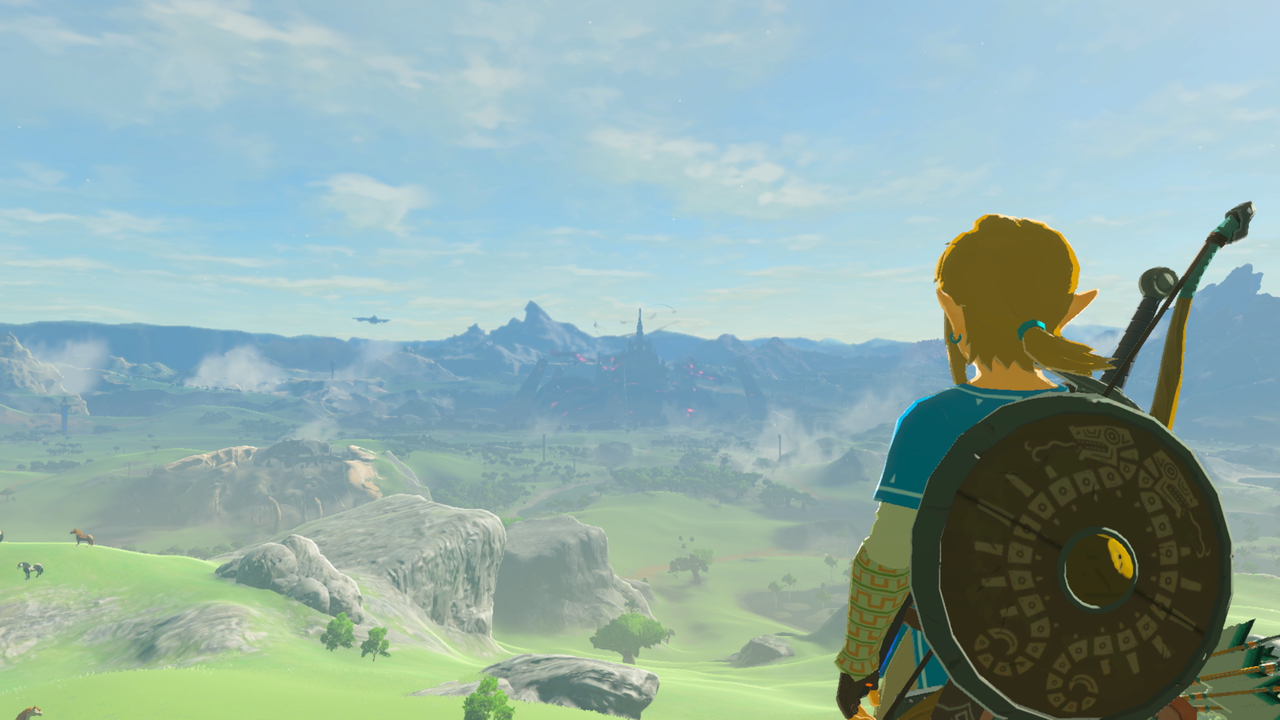
The reason why I chose to present these disparate reviews is to show how nearly all of them (some more than others) don’t shy away from issues in Breath of the Wild. I can attest as much that technical issues (pop-ins and 20-25 frames-per-second on occasion) , voice acting, lack of investment in NPCs, some clunky menu navigation outside of and during combat, and the excessive breaking of weapons can be nuisances, but for these reviewers (and myself to an extent), they largely don’t detract from a “10 out of 10" experience (or close to that). As TechRaptor's review policy states, this kind of score hardly means the game is without flaws, and no other outlet should be so unprofessional to suggest otherwise. A game may come with frustrations, but the overall experience and personal impression it leaves is without equal in this case. Overall, I've come to believe that a score is not meant to be calculated with a robotic checklist or calculated by weighing all of a game’s categories into a mean number. It’s an arbitrary reflection of the written content and a “gut-feeling” we ascribe to a subjective experience that cannot be realistically quantified. Take it as such.
By presenting general observations of these reviews, they all demonstrate profound reflections on Breath of the Wild’s design. There’s a consensual, keen understanding of what Nintendo has tried to accomplish and whether this has been successful or not. They're well-rounded critiques that cover most (if not all) of the essential factors that should come into play for a review, and I encourage you to read them in full to verify my claims. To put it bluntly, they come across as sincere. These writers don’t fawn over Nintendo or the game itself without reason, and it bespeaks how, in a way, the game is “objectively” good for a lot of reasons they agree on. Now, I can’t say this is the case for every positive review, as I'm sure there might be some that exaggerate its pros and downplay its cons, but that's not the norm. Labeling them all as Nintendo or The Legend of Zelda shills is dishonest. On the other hand, to act as if Breath of the Wild’s negative reviews are all “objective” or “clickbait” is wrong as well. These outliers should be scrutinized in the same respectful manner, and with such a small pool of them to plunge into, I believe two such critics offer good criticism.
Breath of Judgment
Jim Sterling actively invites risk with his colorful analogies and outspoken brashness whenever it comes to panning abominable titles greenlit on Steam or joining in on culture wars. Once again, he knew what he was getting into when he gave Breath of the Wild a 7 out of 10. Not only has he drawn 3000+ comments to his review that are best ignored, but his website also underwent a DDoS attack. The latter is inexcusable. To think that anyone should be silenced for their opinions is to ironically profess a lack of confidence in their own. Critically engaging Sterling and determining the quality of his review is what should be done, and while he may have known the ire he would draw, to immediately envision him as an attention seeker is impulsive. Let’s see what he had to say.
Unlike other critics, he finds the difficulty poorly implemented because “the main way in which this game tries to be tough is to make most enemies highly absorbent and more than capable of dropping Link in one or two hits” by “simply pump[ing] up the monsters’ ability to do damage.” Likewise, he adamantly hones in how much he hates the weapon “fragility” system. “Some have defended it, claiming it’s not a big problem and that it ‘encourages variety.’ I’m firmly among those who believe that it doesn’t encourage variety so much as it discourages using most of the cool weapons you find for fear of losing them.” This is just as valid a critique of the weapon durability as are other critics’ defense of it. Whereas Sterling sees it as a forced system that devalues the worth of weapons and the motivation to acquire them, others like Welsh claim that “it's ultimately a liberating change that's reminiscent of Halo's weapon-swap philosophy. It also has brilliant consequences for Breath of the Wild's sweeping reinterpretation of role-playing game convention.” With the difficulty, Sterling’s perceptive observation of how it functions does reveal its simplicity, but many would argue that this forces players to approach enemies in new ways or more astutely observe attacks that could once be shrugged off with easy versions of the same enemies. Nevertheless, his arguments are pretty sound.
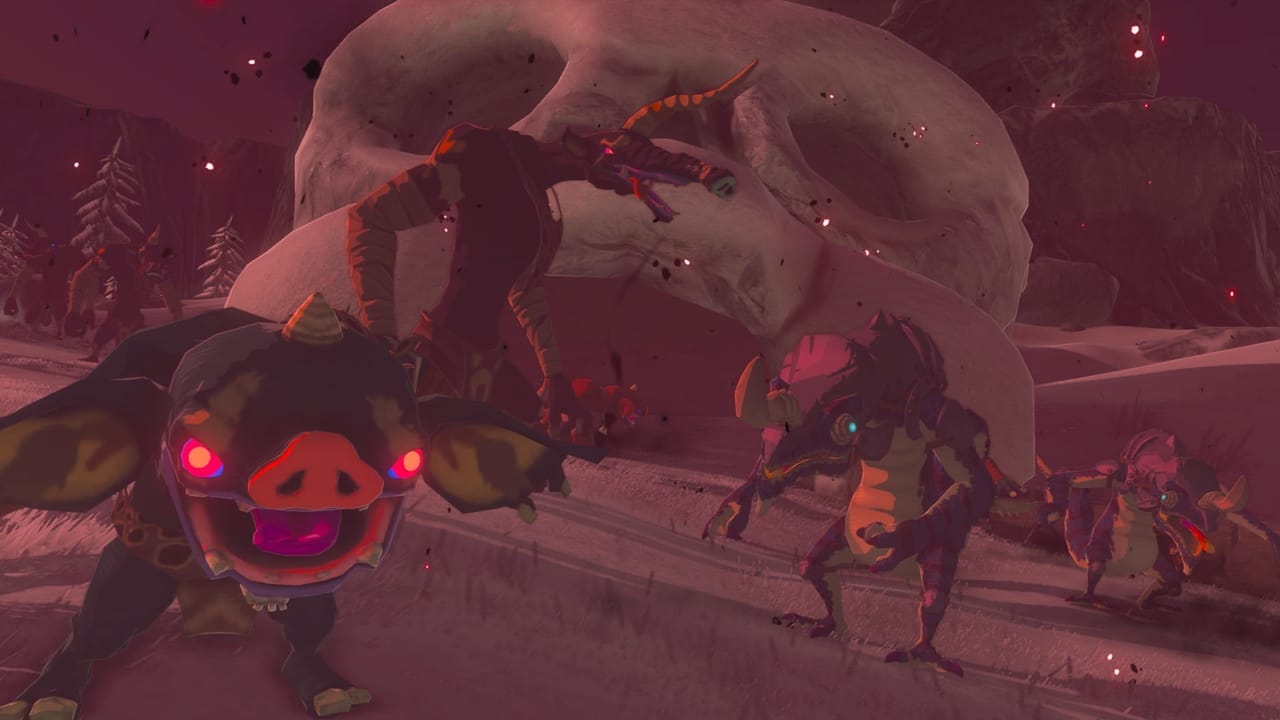
He voices his frustrations over the stamina meter, inconveniences of traversal with the weather, cluttered menus, and more. “I hate that this fresh Zelda is so committed to tripping its audience up and forcing frequent detours and stoppages rather than encouraging the variety others so adamantly laud” because it indicates “[m]inor inconveniences and shows of disrespect toward the player’s time.” It’s funny how Gies writes how respect goes the other way. “Breath of the Wild demands your respect. And if you forget that for longer than a few minutes, it’ll remind you by knocking you flat on your ass.” So, while I personally disagree with some of Sterling's language about how the game treats players, it’s easy to see that he was more caught on the negatives of combat and traversal. However, where his honesty comes through is how he equally praises what the game gets right. “Breath of the Wild [is] an accomplished production. There are so many little touches, so many optional paths, that players inevitably wind up with experiences unique to themselves. [...] There’s so much to love it’s hard to list all the pleasing revelations. [...] If you can imagine doing [something], there’s at least half a chance Breath of the Wild anticipated your imagination and offered a reaction to your action.” It’s a critique that EDGE affirms, writing “for all its nonlinear freedom, [the world] feels not just built but also uncommonly tightly designed.”
Sterling doesn’t dismiss other critics though. In fact, he adamantly wishes he could see how critics ignored these issues, but cannot because “[t]oo many times does Breath of the Wild force its players into performing mundane tasks or sidetrack their way out of the experience.” While I’m not personally bothered by much of what Sterling cares about, especially his obsession over the stamina meter and weapon durability, they are backed by sufficient argumentation with a longing to almost look past them in light of everything else he believes the game nails. It’s balanced work. It makes me reconsider some of my preconceptions about why I’m okay with or even enjoy what he didn’t like. He's had ... less agreeable opinions (I can’t forgive you for Assassin’s Creed II, my good man), but I think everyone has those. We just have to always be aware if they're well founded or not, and with this particular review from Sterling, I would call it just that. It's a welcome opposing viewpoint to call out what other reviewers simply didn’t mind as much. I can say the same for George Weidman’s “review” of sorts. It's entirely composed of pointing out the game's flaws ... in rhyme. Our staff needs to step its game up.
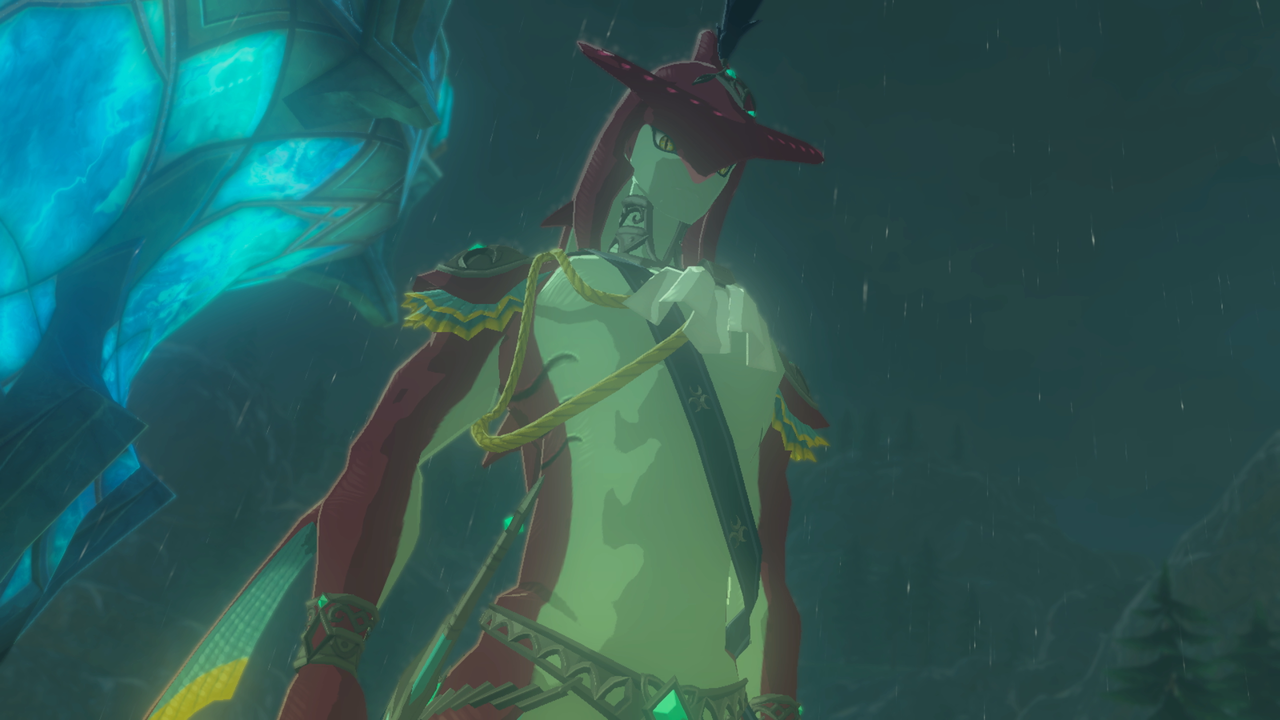
Better known as Super Bunnyhop, Weidman says, “Don’t get me wrong, I like the game, but I know my own playing habits may be to blame. I binged through it all to almost 100 percent completion, so very quickly its charms burnt out to depletion.” His doesn’t hide how his rushed approach could have spoiled his experience a bit, but calling Breath of the Wild one of the “greatest games of all time” is something he's not totally on board with. His experience prompted him to see its flaws in greater detail with 115 hours of playtime. He agrees that the progression, open world, and experimentation make it the “best game of the year” so far, but he does take issue with the eventual repetitiveness of quests and shrines, the lack of enemy variety compared to previous titles in the franchise, and how the characters, side quests, and overall narrative don’t shine in comparison to the emergent storylines players create on their own, but to echo Welsh again, this may have proved difficult to implement given the game’s nonlinear angle.
Weidman’s substantial record of in-depth, level-headed criticism lends credibility to his astute observations that can only come from those who invested in Breath of the Wild as much as he did. Not to find fault with it for the sake of it, but since “all the lavish praise that could be given has already been said, so I’d rather take a look at stuff they can improve for next time instead.” So, these more negative viewpoints are consistently balanced with a natural tone, indicating a fair investment in the title’s content with not only a deep understanding of how and why its design works, but also a respect to the audience and other reviewers’ opinions. While Weidman necessarily keeps praise minimal, both of them provide honest portrayals of the game's content with the footage and/or anecdotes to lend them substance. As I said before, there's a brilliance at the game's core, and to downplay or pass over it too much is skeptical. I see this to differing extents in the following reviews.
Breath of Doubt
Slant's Jed Pressgrove doesn’t seem to be interested in giving much weight to the major components of Breath of the Wild that he enjoyed. He discusses the size and detail of the open world, but laments over how areas feel repetitive if you go through them enough ... which only makes sense since players will have combed most of them beforehand or visited them a second time to clean up remaining side quests. It’s only realistic to expect of any open world game, especially one that’s close to being twice the size of The Elder Scrolls V: Skyrim. He takes issue with the nonlinear tutorial mission because it keeps you constrained from exploring the world right from the get-go, even though you’re incredibly unconstrained with what you do during this time, which most believe is a revolution for tutorials. He makes valid points about the weapon durability, but then asks, “why would anyone want to be so frustratingly taken out of Breath of the Wild's splendorous vistas in any moment, especially after how long it takes for the game to grant you access to the wilderness in the first place, by necessitating that you open up a menu system after finding a suitable place to cook the ingredients necessary for your survival?”
This is the equivalent of Tom McShea’s complaint that “[t]he screen turns to black and white when you take enough damage” in his inFAMOUS 2 review. It's an eccentric, impractical concern if he thinks the idea of menus and inventory management in a game like this is a problem. He suggests the game should have emulated the interface design of an indie game called Westerado: Double Barreled that I, and doubtless Nintendo, have never heard of before. He considers this and other additions such as the stamina meter and camera (the latter being entirely optional) “questionable design choices” that apparently drag the “fresh, individualized approaches to combat and puzzle-solving” so low that he doesn’t bother to explain in detail what’s inherently wrong with some of the traditional open world conventions adopted here that, according to most, are already good, which Nintendo has arguably improved upon here. His issues with the plot structure seem resolved to reject anything the story does well, but overall, his uneven approach to minor flaws as he waxes philosophical in light of other major aspects feels unbalanced. This extends to some of his other reviews as well, and while I think some of his observations are intellectually stimulating, some of his reviews read more like critical literary analyses concerned with the thematic, sociocultural dimensions of video games. I enjoy these kinds of critiques, but this type of cynical approach amplifies what seem to be petty concerns in a game review with a six out of 10.
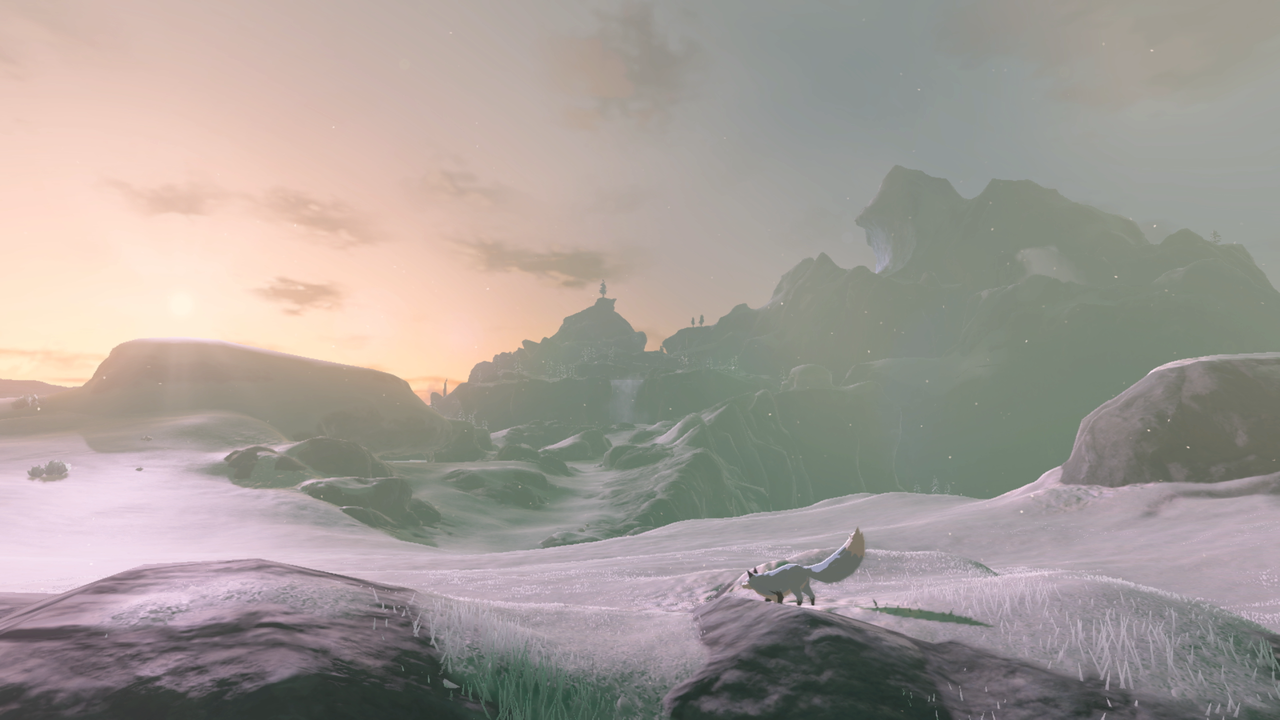
Tom Bond’s review for GBAtemp comes across as unnatural. With the exception of several sentences, the entire review points out the negative aspects of the game, finding fault with peripheral, optional systems and mechanics as if they bare down on the main experience, such as shield surfing and slow-motion bow shots. He calls the weapon durability the worst possible mechanic, which gives the impression the reviewer didn't consider why this was implemented into the game from a reasoned angle, given that his solutions to fix it would conflict or cheapen its intended effect on the gameplay. He claims that the open world is “so empty and lifeless. Practically nothing is going on in at least 80+% of the entire map, it’s just empty hills, plains, and mountains with the occasional enemy encampment, a Stable/outpost thing, and filler-content shrines.” This is an opinion that, as Joe Vargas more strongly suggested, is disingenuous in light of how incredibly, and objectively, detailed the world is for its scale. Finding it boring because you don’t like the puzzles, side quests, and whatnot is one thing if you can explain why, but to portray the world as “empty and lifeless” when it's far from that is fair. This extends to his outlandish estimates that most puzzles “take maybe a minute or two to go through,” how dungeons can usually be beaten “in maybe 15 minutes” and that most players can beat the game in “something like 4 or 5 hours if you take everything slow.” If you want to rush as quickly as possible while skipping the vast majority of the world, this is possible. I've stuck to more of a linear path than most would despite my rampant exploring, and I have conquered around 12 shrines and acquired one Divine Beast. In over 10 hours.
I primarily take issue with Bond’s review because of how the written content’s tone doesn’t match up well with the concluding remarks, where he gives the game a surprising seven out of 10. While some of his overarching points echo Sterling and Weidman, half of the time they're exaggerated and only focused on the negatives. It feels contradictory to say how their similarly scored reviews with parallel points differ in sincerity, but the fact Bond goes out of his way to say he “refuse[s] to overlook [these problems] like everyone else has ‘because Nintendo’” is a trite remark of the overall positive reception. It gives reasonable pause to wonder if he's letting the positive reception influence his review, and while I hardly claim this is the absolute truth, it gives that impression in its forced delivery.
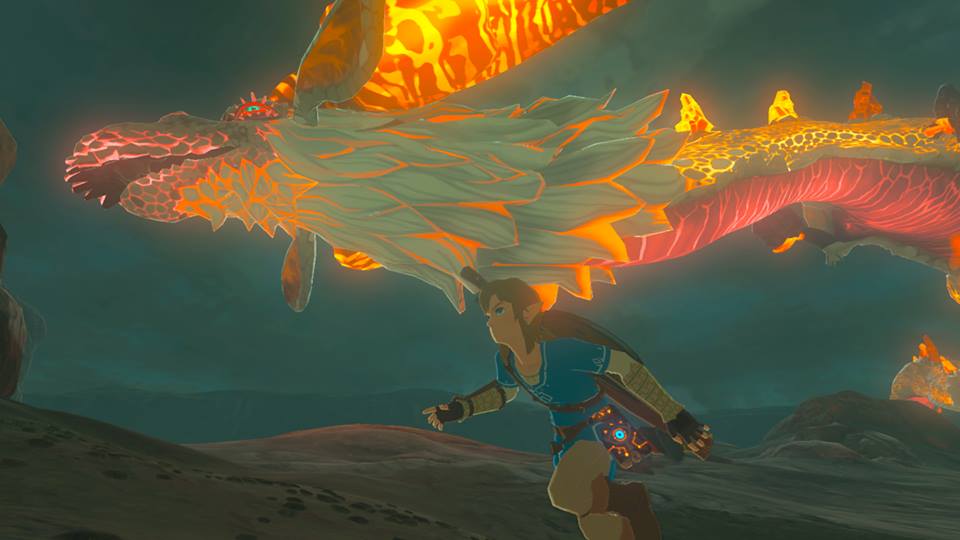
However, the most shocking review comes from Niche Gamer’s Michael Jordan. It’s telling enough that he published a PSA proclaiming his words to be the gospel truth to “hopefully dispel a bit of the narrative going around with the game.” In a complementary video, the author states if anyone gave the game a 10, “you should really question their integrity as a reviewer.” He repeatedly claims they’re ignoring “massive” performance issues that plagued review copies even more, which he doesn’t verify with any evidence. These critics are “lying” and anyone who gives the game over a 7 is purposefully ignoring flaws in the game. That calls 97 percent of the current 114 critic reviews aggregated on OpenCritic into question.
The actual review itself is surprisingly positive compared to the previous examples and more consistent with its given score, which praises the visuals, exploration, sound effects, and the “vast, varied, and unique” landscapes, but when negative issues are brought up, they dip into weak assertions that contradict some of these claims. The expected technical issues are addressed and valid to an extent, but something that no reviewer–as far as I know–claims is that “the frame rate issues impact not only the visuals but the general game feel and your ability to play the game. Add to this the potential for your controller to desync at random, and you have a recipe for frustration.” I feel as though Jordan’s frustrations with the combat come more from anger toward the game’s difficulty (which is reasonable enough) than the technical performance, which is provably playable even with its occasional hiccups, even on the Wii U. To say that “[m]any encounters require that the game is working perfectly for you to have a successful fight” is not consistently reproducible. As a side note, bashing the game for the Switch’s hardware hitch with Joy-Cons disconnecting is misplaced.
He equates the difficulty to the level scaling, and while many people have legitimate concerns with the way this is simply buffed with new foes in other areas, he calls being one-shot and the gear-focused upgrading “bad design, and less intelligent people would label this as hard when in fact it’s still rather easy when the game works properly.” I’m not sure whether to point out his contradictory stance on whether the difficulty is a performance or design issue or that he ironically insults anyone who would find the game difficult if it was functional, which it is.
He considers all 120 Shrines’ puzzles “uninteresting” in his video review, which would likely include the main dungeons under the same umbrella since they “offer no real challenge whatsoever.” The world itself may be vast, but is “deeply devoid of interaction, outside some key areas. The majority of the land is fleshed out with wildlife, bugs, and plants you can hunt, gather, and collect. Sadly, the systems feel half finished and unintuitive.” This is largely a farce given the myriad ways players have shown how you can interact with the environment, NPCs, towns, and enemies in your travels. He also misses the point of cooking as an experimental task by casting this as a negative in itself. It “is trial and error, and even finding out how to cook is something the player will most likely fumble with at first: go to menu, inventory, select hold item (max of five items), and walk over to a lit fireplace with a pot on it.” His issues with not being able to record discovered recipes is a concern, that I, too, wish were in the game, but considering ingredients tell you their effects, there’s really no need for one. It only takes common sense to cook something up old or new.
Other exaggerated claims he makes are that “[m]any tracks are 10 second clips on repeat" and how “[t]he sound effect [sic] on the other hand are amazing, and it’s a real shame that they get muted by the music,” which doesn’t happen, nor does it occur often since the music is more sporadic than in most open world games. He comments on the story and its potential, but how it shouldn’t be “presented as optional when it should be mandatory,” which is something he doubles down on in the comments section. “The story for a game should not be withheld as a reward. I cant [sic] imagine that line of thought for anything.” I suppose that means Skyrim and Fallout 4's optional campaigns are inconceivable.
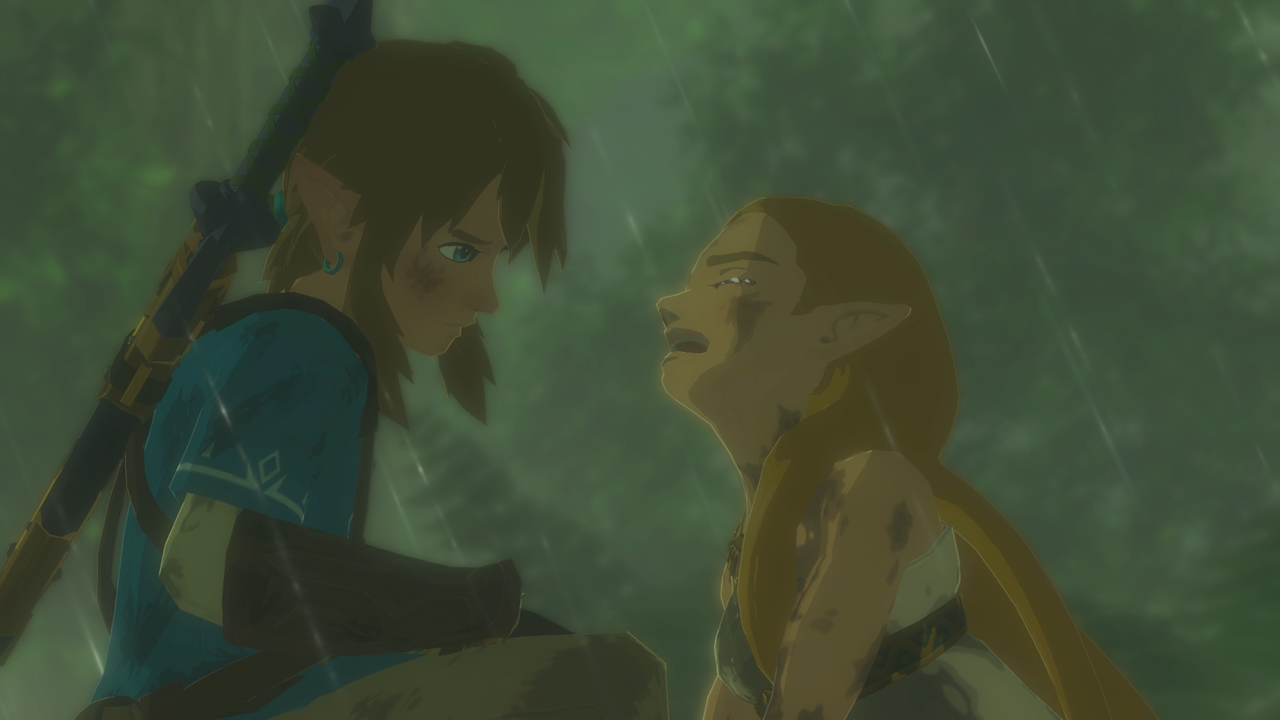
He concludes saying that no one should “listen to day one reviews” and that “[t]his is easily the weakest Legend of Zelda game in the last 20 years, and some simple design choices combined with the time to QA correctly could have produced the best game in the series.” Considering his harsher remarks in the comments section stating that the “[c]ombat was trash” and how “the puzzles are boring and easy, a toddler could figure it out,” I don’t think game design he considers this bad can just undergo simple design choices and QA. It sounds more like a complete reevaluation of the very structure of the open world and its systems is needed from his perspective.
Like Bond, I have no problem with the general sentiments Jordan is making with his criticisms, but the majority of them are gross exaggerations or signs of someone who isn’t approaching the game fairly. I don’t believe in accusing people of playing a game wrongly because people’s styles, interests, or reflexes are not attuned to certain genres, but there’s something to be said when someone misses the points of a game’s mechanics or rules. There’s something to be said if they poorly paint aspects of a game’s design when they don’t seem interested in honestly engaging it. He misses the forests for the trees, and Jordan doesn't make things better by tweeting that perfect or near-perfect reviews have “no credibility” and how he openly denies insulting critics or readers’ intelligence for disagreeing based on the contrary here and there. There’s also the occasional haughtiness.
It seems ridiculous as I write this to find so much wrong with a review that’s still a fairly positive review of Breath of the Wild, but it's not often I come across one that reads in such a vindicated, conflicted manner with its tone and message. Unlike Sterling and Weidman, I don’t believe Jordan is as sincere or critical with several of his major observations despite the amount of time he spent with the game. After all, he does say in the PSA video that "[n]ot many games that I see are sevens. [laughs] You know, realistically, especially being put out now." If that's the case, then why are 68 percent of his reviews over that score, including the likes of Let It Die and Poochy and Yoshi’s Woolly World, which received 10 out of 10 each?
Mainly, I hope he improves his attitude toward readers and critics. In the end, his opinions are no less permitted than anyone else’s, but he serves as an example. It's difficult to point out what's good and bad criticism when people make the same points, but the difference comes in how they affect the overall style and talking points. When there's such a wide consensus that something like Breath of the Wild has many wonderful factors and redeeming qualities, it seems reasonable that they would overpower or at least balance out with what flaws there are. I believe Sterling and Weidman give this impression considering their leveled accusations and balanced perspectives. With the other examples, I do believe they contain many valid perspectives. However, triviality, negativity, and disrespect seem to cloud part of their judgment, respectively speaking. This is why any reader or critic should approach reviews with an idea of what quality criticism usually contains. I'd like to offer a short guideline on how you can try to determine this.
Guide in the Wild
Our staff's content is obviously subject to this. One of my colleagues, James Galizio, is at the tail end of published Breath of the Wild reviews. He acknowledges the discussion surrounding it over the weeks.
"A lot has been said about Breath of the Wild these last few weeks. Some call it one of the best games to ever release, others say it’s a game that doesn’t live up to its inflated hype, making what is otherwise a standard open-world game into something greater than it actually is. Regardless of which stance I took, I don’t think I’d be able to say anything truly different about the game. Regardless of your personal opinion on the game (and at this point, everyone most likely already has one), the latest Zelda title has more than secured its spot in the history books as one of the most critically acclaimed titles of all time. I’m just another voice adding to the dialogue."
Still, James provides a balanced perspective that significantly contributes to its overall reception, especially with its criticisms. He highlights “a lack of enemy variety and a flatlining difficulty” compounded by the eventual stagnation of tackling Shrines and finding Korok seeds. He also dives into the controversy of weapon durability by weighing both sides into consideration, but instead of merely finding fault with it or outright praising it, he speculates that the nonlinear approach to the game is “the biggest reason why weapon degradation was a thing. If it wasn’t, the game would lose almost any semblance of difficulty after only the first dungeon.” In other words, if players could stick with their greatest weapons forever or repair them, it would imbalance the reward distribution and its difficulty that depends on gear-based leveling. James understands that part of the design behind Breath of the Wild depends on these factors.
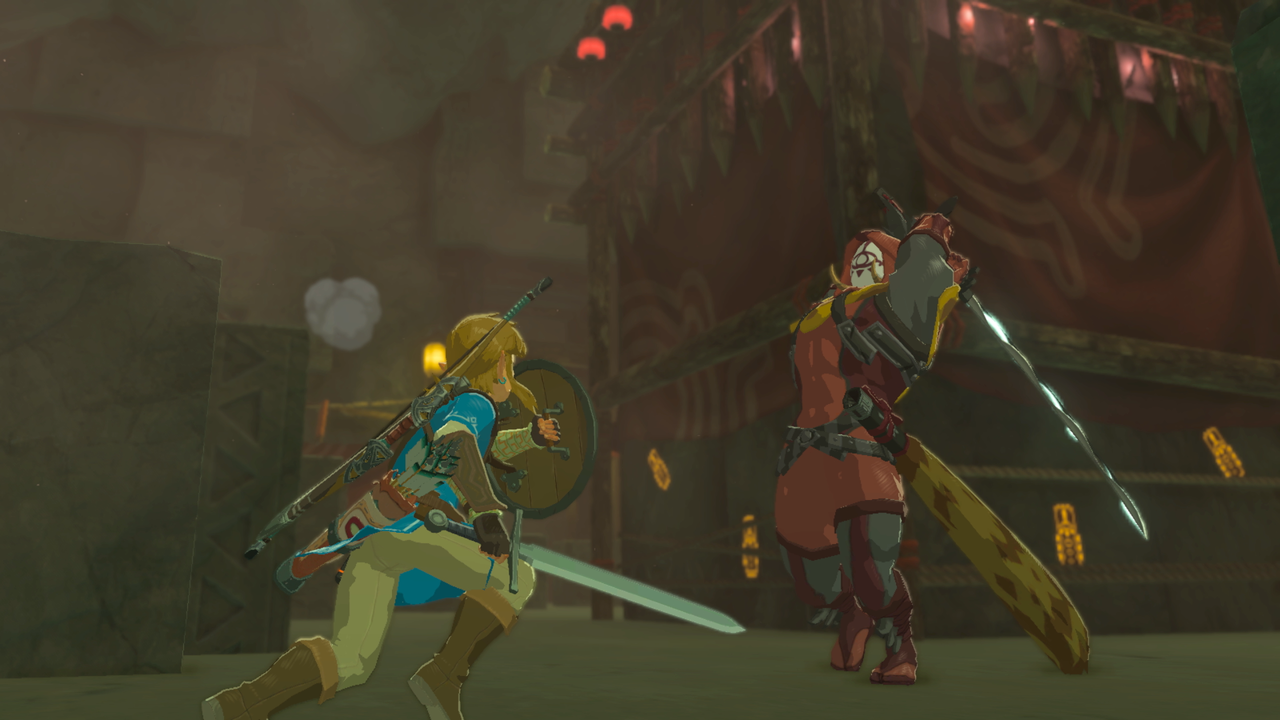
"With all that being said, even if Breath of the Wild‘s magic begins to wear off halfway through I can’t truly say that it loses the magic entirely. Even at its worst, Breath of the Wild is a fantastic game, albeit with some flaws of its own. At it’s best? The latest Zelda is the best game that I’ve played in years." He echoes some of the negatives of the lowest reviews, and yet rewards the game a 9.5 out of 10. Would you say his criticisms are credible? I’ll let you be the judge of that, but I personally believe his review is the final piece that helps form the four components I believe readers should always check for in your standard review.
1. Consistent Balance
A reviewer should cover as many aspects of a game as possible, focusing on its key component (be it the gameplay or story) without getting lost in minor details or caught up in side points that bear little weight on the main attractions. To do the opposite is to unfairly brush aside a game’s primary strengths or faults, which is to evaluate it with odd standards. Easy Allies' review by Michael Damiani is a great example.
2. Natural Tone
A reviewer can be wholly negative or positive, but the manner in which opinions are conveyed speaks volumes for the writer’s approach to a game. It seems hypocritical to say so, but if the vast majority of reviewers believe a game is exceptionally good, for someone to say almost nothing positive about it or largely focus on its flaws is a good indicator of someone simply trying to prove a point. Ask yourself if the style and language feel out-of-character, forced, or contrived. Is the language too sappy or flowery? Look for a level-headed, neutral tone that speaks of having no allegiance to developers or fans. I still find CJ Andriessen's review for Destructoid one of the best examples with its down-to-earth approach.
3. Fair Investment
A reviewer should always devote as much time to a game as possible by disclosing this explicitly or implying as much through anecdotes of their experience. More importantly, a reviewer should address the core design by understanding and thinking within its logic and purpose. Does it make sense, clash with other ideas, or simply not work well? Merely proclaiming one doesn’t enjoy a style of gameplay or story is one thing, but calling it bad and providing no substantial reasons why is lazy. One can spend a commendable amount of time with a game and still not give it a fair shake depending on their approach. Say what you will, but I consider Joe Vargas exceptional at this with all of his reviews. His Breath of the Wild review is a great example, especially with all the pieces of footage he inserts from streams to show how much time he puts into games.
4. Respectful Understanding
Most of the time, it’s best for reviewers to simply not acknowledge any sort of outside opinions on a game, as they can subtly or directly influence the angle a reviewer takes to play it safe with the majority or go against the grain for kicks. However, whether a review does this or not, a respect toward opposing viewpoints of readers and other critics is a sign of confidence in their own stance and integrity. This point even extends to a game itself. Reviewers shouldn't go in having made up their mind up already or play it in such a way that they remain oblivious or bullheaded to individual errors in their actions and thinking while playing. There are plenty of games with bad design many agree on, but you can make good design seem bad if you go in with the wrong perspective or just don't pay attention. I believe Jim Sterling's review exemplifies this point, and while my bias is showing, I'd say our review falls under this specific category, too.
When these points have been analyzed, the most important step comes next: rationally present your defense of or objections to the reviewer by critiquing the content of their words, not the person themselves. Only then can we have an honest, open conversation about any review to improve not only the cultural approach to this side of game journalism, but perhaps the critics themselves.
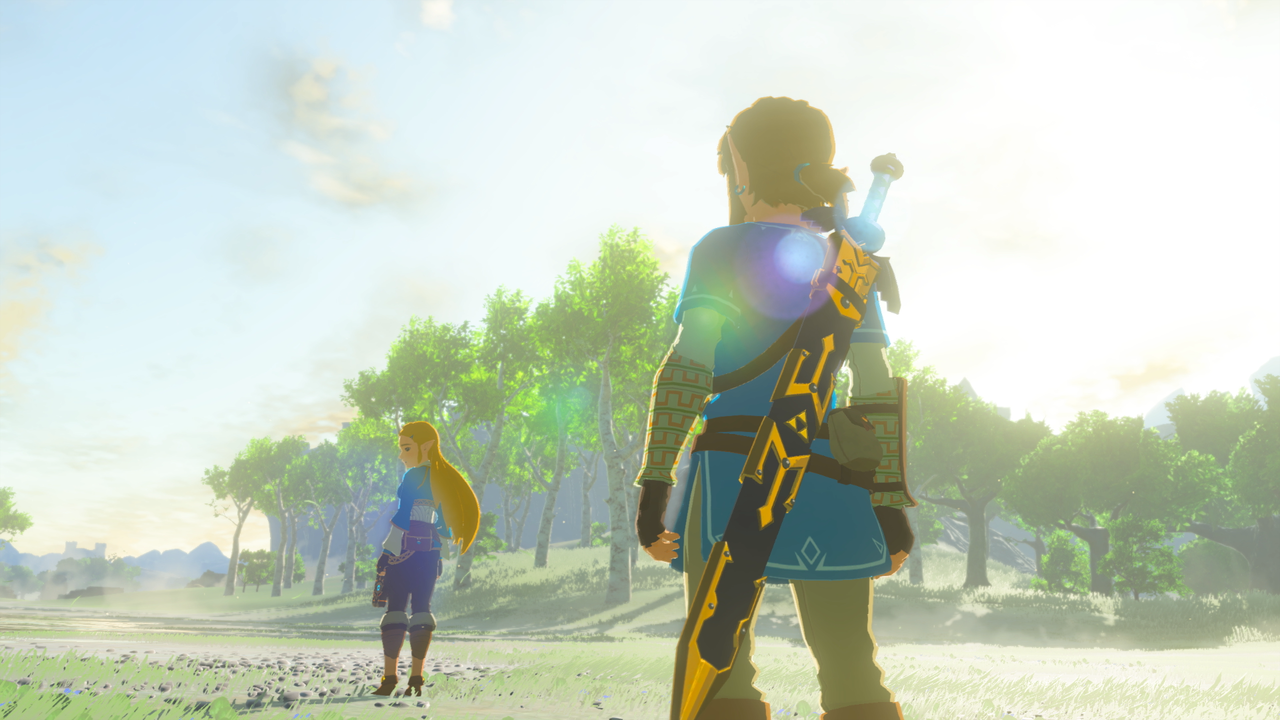
To parse through fields of subjectivity from an outsider’s perspective with an objective bend is ... tough, to say the least. I readily admit that my observations are open to debate and should be criticized, as I’m sure some of you may not agree with my assessments of one review, but that’s what I want: a dialogue of how writers like myself can improve in all sorts of ways. We should discuss how readers like yourself can more effectively judge and respond to reviews by adding to my guideline. That's what TechRaptor wants.
All opinions are valid, but their sincerity and quality can differ upon close inspection.
George Weidman puts it this way. “Perfect games don’t exist, good criticism shouldn’t make you pissed, and different tastes can happily co-exist.”
We could learn from such pithy statements.
What do you make of Joey Thurmond's remarks? What are your standards and expectations of game critics? How do you think we can create a better climate surrounding the reaction to contrarian opinions and justly respond to good or lacking criticism? Sidon down in the comments to let us know.
Have a tip, or want to point out something we missed? Leave a Comment or e-mail us at tips@techraptor.net
